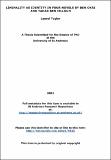Liminality as identity in four novels by Ben Okri and Tahar ben Jelloun
Abstract
This thesis compares two novels each by Nigerian writer Ben Okri and Moroccan
writer Tahar Ben Jelloun. By examining apparently transformative moments in the lives of each
protagonist, Azaro and Zahra, its principal aim is to show how liminality characterises their
identities, and is a source of personal and potentially political liberation, mirrored in the
narrative techniques.
The Introduction demonstrates the centrality of identity to these novels and the
domain of postcolonial studies and defines the key concepts in relevant literary, theoretical and
political contexts: identity, hybridity, liminality, magical realism and the
postcolonial/postmodern debate.
Chapter I establishes Azaro and Zahra as liminal beings from birth, whose childhood
rituals are incomplete and who continually subvert parental and social expectation. This
examination of liminality may be extended by reading the characters as emblems of their
respective nations-in-waiting.
Chapter II focuses on the tension between biology and culture within Zahra's gendered
identity and demonstrates empowerment in her choice to remain liminal in a 'potential space'.
Azaro's shifting sexual awareness is examined as a manifestation of his liminality. The
allegorical reading of Zahra's life is continued, and a connection made between sexual and
political corruption in the English texts.
Chapter III centres on the fluidity of Azaro's boundaries and perception. Like Zahra's,
his liminality is chosen, as he decides to live in a potential space between human and spirit.
Zahra, too, has a special relationship with the spirit world; she and Azaro are shown to have
revelatory visions of political significance.
The Conclusion brings together the analysis of Azaro's and Zahra's identities before
extending the liminal states of the protagonists to those of reader and artist. It concludes that
these texts offer new opportunities for the understanding of postcolonial texts and moving
beyond the duality of the postcolonial/postmodern debate.
Type
Thesis, PhD Doctor of Philosophy
Collections
Items in the St Andrews Research Repository are protected by copyright, with all rights reserved, unless otherwise indicated.

